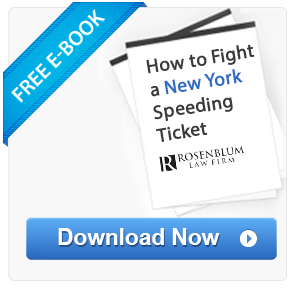Page Contents
- Fines & Points
- Hiring An Attorney
- Out-of-State Drivers
- How to Fight a Speeding Ticket
- Case Law Analysis
- Types of Speeding Tickets
- Speeding Ticket Data
What Is the Cost of a New York Speeding Ticket?
Fines
For a first New York speeding ticket conviction, the fines can range between $90 and $600. Specifically, it will cost $45-$150 for speeding 1 mph to 10 mph over the limit; $90-$300 for speeding 11 mph to 30 mph over the limit; and $180- $600 for speeding 31+ mph over the limit.
Surcharges
New York automatically imposes an $88 or $93 surcharge (depending on whether the driver was in a city or a town/village) in addition to the fine for the speeding ticket.
Points
The New York DMV will assess 3 points for speeding 1 to 10 mph over the limit; 4 points for speeding 11 to 20 mph over the limit; 6 points for speeding 21 to 30 mph over the limit; 8 points for speeding 31 to 40 mph over the limit; and 11 points for speeding 41 mph or more over the limit.
Auto insurance premium increase
Insurance companies can increase drivers’ premiums based on the points assessed on their driving record. Rates can rise dramatically with just one speeding ticket. Numerous studies have found that a single traffic ticket can lead to up to a 30 percent increase in a driver’s auto insurance premium.
Driver Responsibility Assessment Fee (DRA):
Drivers who receive six or more points as a result of violations that occurred within an 18-month period will be subject to an additional fine known as the Driver Responsibility Assessment fee (DRA). This penalty costs $300. An additional $75 will be imposed for each point after the six-point mark. This fee is paid to DMV and is separate and in addition to the court fines associated with the ticket.
Fines for second offenses and speeding in a work zone are even higher.
First Time Speeding Ticket Penalties
| NY Speeding Violation | Total Fine, Surcharge & DRA | Points |
|---|---|---|
| Speeding 1-10 MPH over limit | $133 – $238 | 3 points |
| Speeding 11- 20 MPH over limit | $178 – $388 | 4 points |
| Speeding 21- 30 MPH over limit | $478 – $688 | 6 points |
| Speeding 31-40 MPH over limit | $718 – $1,138 | 8 points |
| Speeding 41+ MPH over limit | $943 – $1,363 | 11 points |

Need help with your speeding ticket?
Call Now - We've Fought Over 100,000 Traffic Violations
Quick, free, and no obligation.
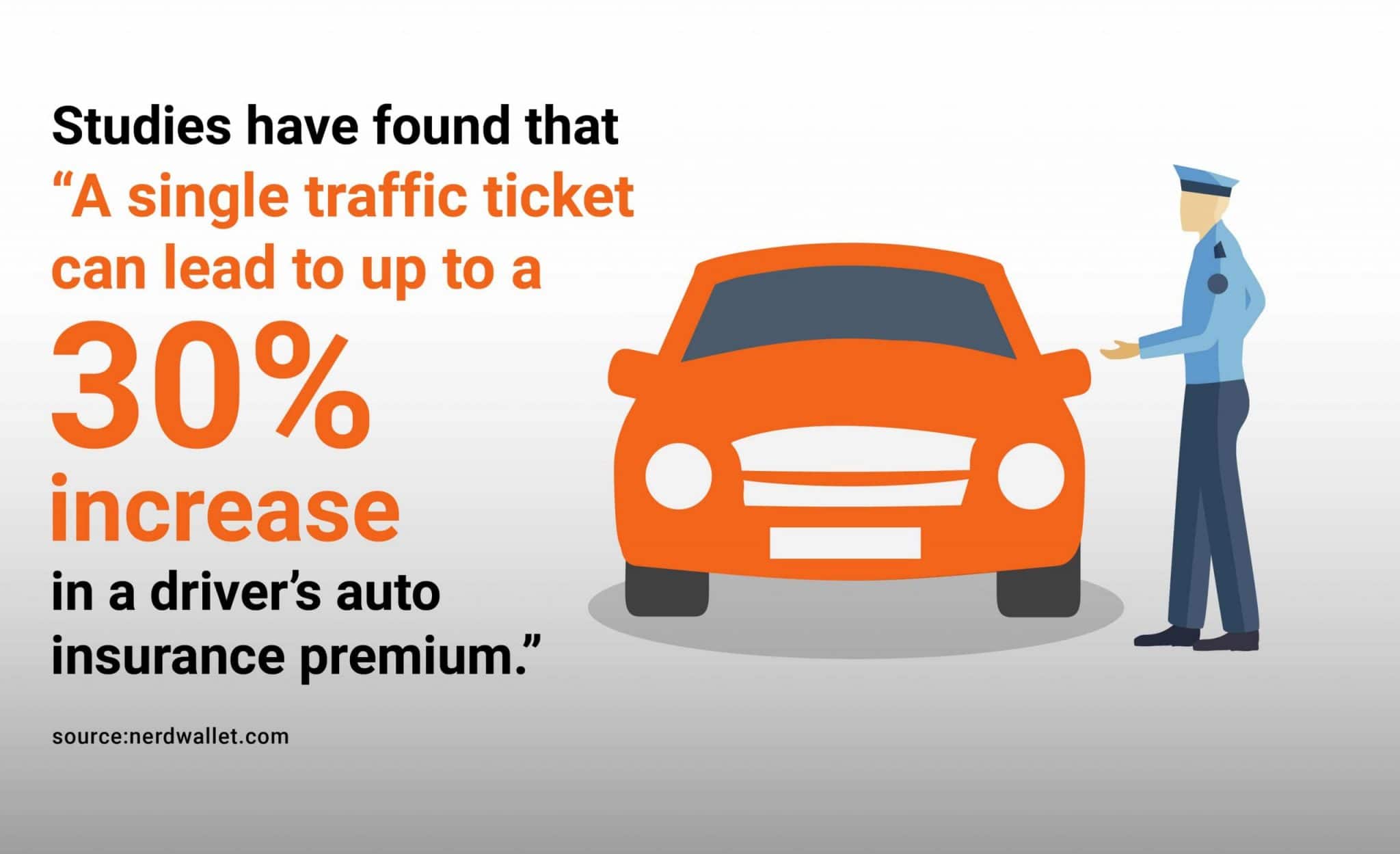
Hiring an Attorney to Fight a New York Speeding Ticket
The combination of fines and surcharges that result from a speeding ticket can cost hundreds and even thousands of dollars. What’s more, insurance companies are very likely to raise the insurance premiums of drivers found guilty of speeding. As such, in most cases hiring a lawyer to get the ticket reduced or dismissed (if possible) will save you money.
For the vast majority of traffic violations in New York State, an attorney can reduce a speeding ticket to a non-moving violation such as a parking ticket or plea it down to a lesser-point ticket such as failure to obey a traffic control device (a two-point, non-speeding violation). Such reductions can lower or eliminate the impact on one’s driving record and auto insurance rates.
Once hired, a lawyer can take over the case. The driver can sit back and relax, letting him/her do all the work, including appearing in court on the driver’s behalf.
New York City’s TVB
There are courts that will not reduce speeding tickets or engage in a plea bargain or settlement of any kind. New York City sees a large volume of traffic on its roads and set up a special hearing office within the Department of Motor Vehicles to process traffic tickets. This office is known as the Traffic Violations Bureau, or “TVB” for short.
Speeding tickets issued in New York City should not be ignored. In fact, you will definitely want to seek legal advice because the TVB has stricter rules than most courts. It doesn’t allow plea bargains, it doesn’t require proof of guilt beyond a reasonable doubt, it limits the kind of evidence a driver can demand access to before the trial, and it allows the police to admit hearsay evidence.
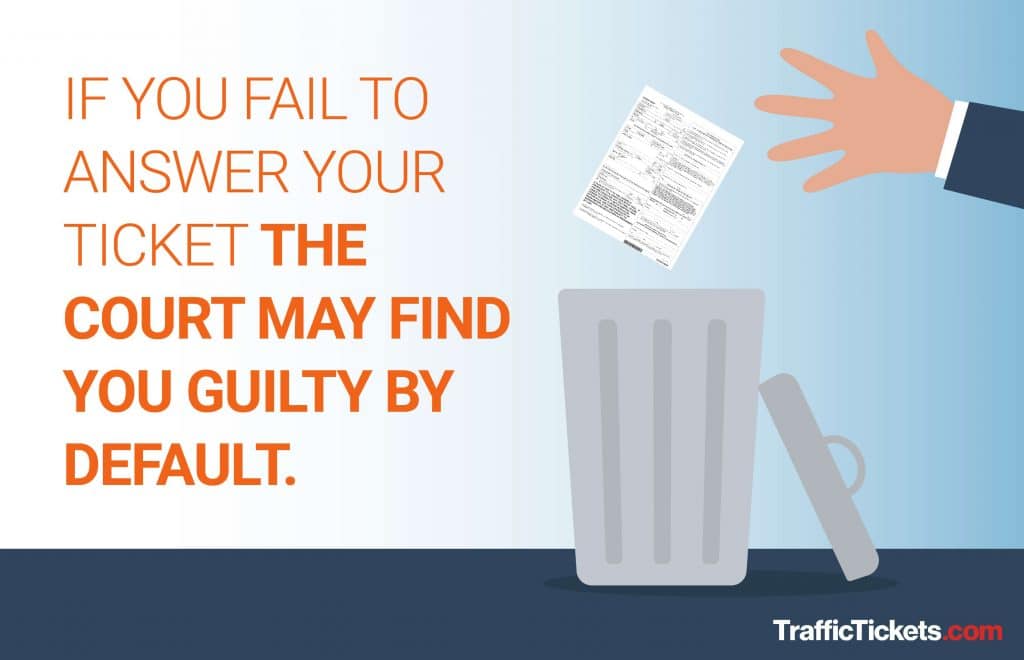
Pros of Hiring an Attorney vs. the Cons of Pleading Guilty
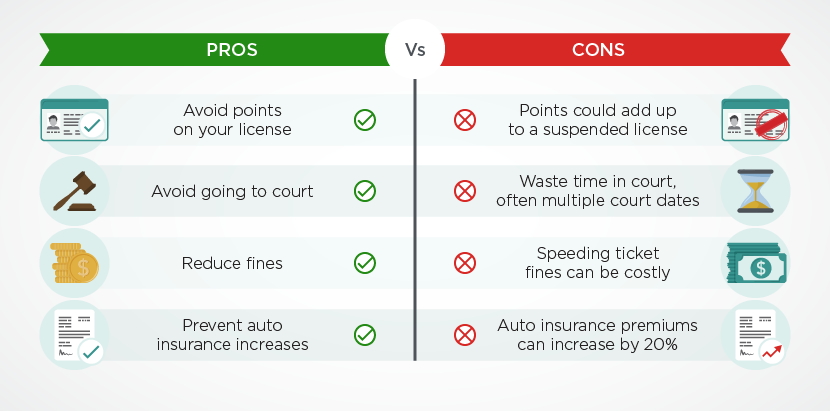
Notice: Tickets for speeding in a work zone or school zone can cost twice as much as a regular speeding ticket.
How to Read a New York Speeding Ticket
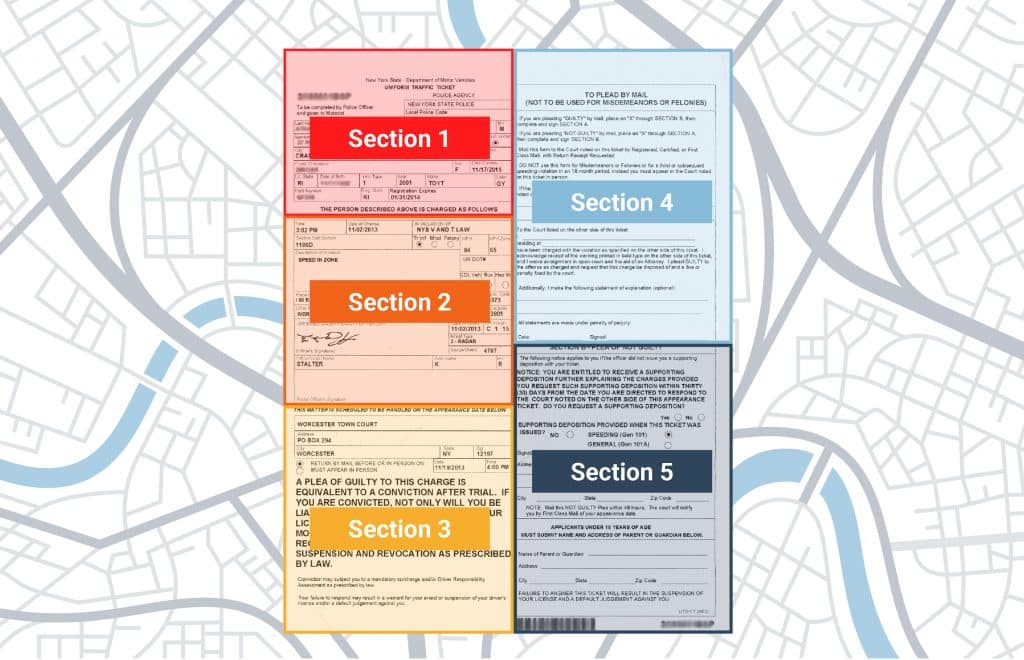
- Section 1 - The Defendant’s Information
These boxes display numerous identifying data about the defendant including name, address and information about the car being driven at the time of the stop. Note: If the officer made a minor mistake in the section (e.g. the officer wrote down the wrong color of the car) the case will NOT be dismissed.
- Section 2 – The Charges
The “Section Sub Section” box indicates which section of the law the defendant is being accused of violating. Below is a list of common New York traffic violations as well as the New York Vehicle & Traffic Law sections they fall under, the amount of points (if any) and the maximum fines and NYS surcharges attached to them. It also lists the location and officer’s information.
- Section 3 – The Court
This particular Section shows the name of the court and its address, along with a date and time for a response, either by postal mail or in person.
- Section 4 – Plea of Guilty
Drivers choosing to plead “Guilty” to the charges should fill out this Section and mail it to the address of the court mentioned in Section 3.
Important Note: Many people think that if they plea guilty “with an explanation” there is a possibility that the court will consider their explanation and decide to find them not guilty. This is a big misunderstanding. Anyone who fills out this portion of the ticket and mails it in will be convicted of the offense.
The only way to challenge the charges or get the charges reduced is to plead “not guilty” (see next Section). It is also a common belief that a person should plead “Guilty” if he or she knows that he was, in fact, guilty. It is important to keep two things in mind: Entering an initial plea of “Not Guilty” does not mean that there is no going back. To the contrary, all it does is preserve the right to a plea bargain or trial. A person can always change his/her plea to “Guilty” later on, and in most cases where a plea bargain is offered, he/she will be pleading guilty at some point, but to a less severe offense than the one initially charged with.
- Section 5 – Plea of Not Guilty (recommended)
Those who choose to plead “Not Guilty” must fill out section 5. The “Not Guilty” section features a spot to request a supporting deposition. A supporting deposition is a written sworn statement detailing the traffic violation and it is signed by the law enforcement officer who issued the ticket. Remember, it is everyone’s Constitutional right to to plead “Not Guilty.” A person can always change the plea later on, and if an acceptable plea bargain is offered, then he/she will ultimately be pleading guilty to that reduced charge.
For more information, drivers should download the How to Read a Speeding Ticket PDF.
How a New York Speeding Ticket Impacts Out-of-State Drivers
It is a common misconception that drivers from other states can and should ignore a New York speeding ticket. The reality is that New York State can suspend someone’s right to drive within its borders for failing to respond to or pay a speeding ticket issued here. Likewise, a driver who pays a New York speeding ticket can still face the consequences of points, insurance increases and hefty fines associated with a conviction. New York will also inform the home state of a driver of any convictions, which means those convictions are very likely to end up on a person’s driving record.
Important: A driver from another state who fails to pay (or fight) a New York speeding ticket could have his or her license suspended.
How each state handles a New York speeding ticket varies. Here are some examples:
- New Jersey- A driver licensed in New Jersey who is ticketed for speeding in New York faces two points on their license for each conviction. These points are assessed by the New Jersey Motor Vehicle Commission. The points count towards suspension of both New York and New Jersey driving privileges. Read More
- Connecticut- Drivers from Connecticut should be aware that New York does not allow drivers to plead nolo contendere (i.e. no contest) to speeding tickets. As such, the only way to avoid getting points for a New York speeding ticket is to get it dismissed or plea it down to a no-point violation. Read More
- Pennsylvania- In the Keystone State, driving 1-5 mph over the limit is not considered speeding. However, in New York it is a three-point offense with a maximum fine of $150 (+ the surcharge). Pennsylvania drivers will be happy to know that their home state will not assess points for out-of-state violations; however, their auto insurance companies may still raise their rates as though the violation occurred at home. Read More
- Other states- Drivers licensed in any of the other 50 states and Washington, D.C. can find more information about New York speeding tickets by visiting our out-of-state license page.
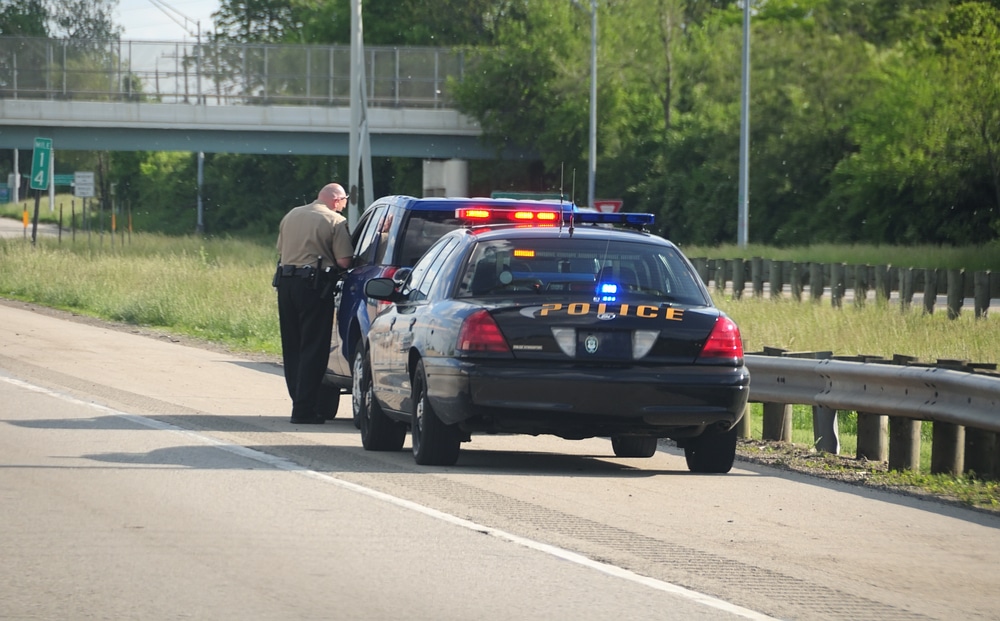
How to Fight a New York Speeding Ticket
It is not advisable that a driver attempt to fight a speeding ticket on their own. Most prosecutors, judges and even officers are adept at questioning individuals so as to extract information that can result in a conviction. Even a person who is truly honest and genuinely innocent can accidentally say something that can result in being convicted of a traffic offense. By contrast, a skilled and experienced traffic ticket attorney will know how to navigate such questions and present the driver’s case in the best possible light so as to mitigate or avoid a conviction.
Another reason drivers should consider hiring an attorney is that traffic court is nothing like criminal court. In most criminal cases, the prosecution must prove a defendant understood what they did was wrong or had deliberately intended to commit the crime. However, this does not apply in traffic court, which operates under the rule of strict liability in most cases. Strict liability removes the mental state component from the equation. In other words, a driver can be convicted of speeding regardless of whether or not he/she knew they were exceeding the limit or intended to speed.
As such, a driver who insists they were not aware that the speed limit was only 55 miles per hour on the New York Thruway will not get out of a ticket. All that matters is whether or not it can be proven the driver was speeding. Similarly, there are no legally permissible justifications for speeding. For example, telling an officer that they really need to use the restroom, are having a baby, or any other excuse will not likely sway an officer or judge.
To understand the tactics needed and challenges faced in defeating a New York speeding ticket, one must turn to existing case law.
Case Law Analysis
New York case law reveals several crucial points to bear in mind as a driver.
First and foremost, a New York speeding ticket issued by a police officer who does not use a mechanical device like radar, and, instead, estimates it will still be sufficient to convict a driver for speeding. (See People v. Olsen, 22 NY 2d 230.)
The court in Olsen explained its rationale by saying:
“The rule is well settled in this State that opinion evidence with regard to the speed of moving vehicles is admissible provided that the witness who testifies first shows some experience in observing the rate of speed of moving objects or some other satisfactory reason or basis for his opinion.” (See People v. Olsen, 22 NY 2d 230.)
Similarly, in People v. Dusing, the court summed up in one cogent statement a governing rule that applies to all drivers ticketed for speeding in New York. The court concluded,
“The sum of the combined Magri, Heyser and Marsellus holdings is: first, that a reading from an untested speedometer or radar device is admissible but is not[,] without more[,] sufficient for a speeding conviction; and, second, that the resulting deficiency in proof can be supplied by the testimony of qualified observers.” (See People v. Dusing 5 NY 2d 126.)
It is worth noting that the Dusing court said “observers,” not “officers.” This means a police officer does not have to be the one to testify against the driver. In most cases, if the prosecution finds any “qualified observer” (e.g. another driver on the road who saw the defendant), that person combined with the radar evidence will be enough to convict a person of speeding.
Second of all, the fact that a speeding ticket is not a crime appears to cut both ways. Since speeding is usually not a crime, it does not carry with it the severity of most criminal penalties. However, since it is not usually a crime, “not all the constitutional protections normally afforded to criminal defendants need be applied to those charged with such a minor offense.” (See People v. Phinney, 22 NY 2d 288.)
Lastly, a driver might be in for a rude awakening if he expects to be able to compel the TVB to turn over pertinent documents to him. Although the TVB has the right to do so, New York law does not require it to do so.
In Matter of Miller v. Schwartz, an attorney requested certain documents and information regarding the type of radar that was used to pull over his client. The TVB denied the request and explained that traditional discovery rules do not apply in the TVB. The lawyer took the case to court to compel the TVB to give him the documents. However, the court sided with the TVB and denied the attorney’s request.
The Schwartz court based its conclusion on the well-settled rule that there is no general constitutional right to discovery in criminal cases or administrative proceedings (See Weatherford v Bursey, 429 US 545 and National Labor Relations Bd. v Interboro Contrs., 432 F.2d 854, cert. denied 402 US 915).
Ultimately, this ruling reveals how difficult it can be—even for an attorney—to navigate through the complicated TVB system. If nothing else, this case shows drivers who get TVB tickets the importance of hiring an experienced traffic ticket attorney familiar with the TVB’s rules and procedures.
Key Takeaways
- For a radar gun reading to be used to convict someone of speeding, the gun must be certified to be in good working order following specific procedures.
- If a radar gun is found to be untested, the gun’s reading can still be used if the officer or another “qualified witness” testifies that the driver was observed speeding.
- That qualified witness does not need to be a police officer.
- With or without a radar gun, a police officer’s visual estimate of a driver’s speed is enough to justify a speeding ticket (and potentially convict the driver).
Common Questions About New York Speeding Tickets
- Does New York report speeding tickets to other states?
Yes. New York participates in the Driver’s License Compact, an interstate agreement that allows most states to share information about speeding and other traffic convictions that occur in their state. An out-of-state driver who pays or is convicted in court of speeding in NY will most likely see that conviction listed on their driving record which could lead to license suspension and other consequences.
- How long does it take to get points off a license in NY?
Points will remain on a driver’s license for as long as the conviction remains on the record (up to four years). However, 18 months after the date of the violation, those points will no longer count toward the total number needed for a suspended license or Driver Responsibility Assessment. Contrary to popular belief, a DMV-approved driver safety course will NOT remove points assessed on a license. Instead, it will increase the threshold of points needed for a suspension by a maximum of four.
- How much do New York insurance premiums go up for a speeding ticket?
There is no single answer to this as it depends on so many factors, including past driving history, age, even the level of income and education. Some studies have found that a single speeding ticket can increase rates by 30% or more.
- What is the statute of limitations on a New York speeding ticket?
Technically, there is no statute of limitations for a speeding ticket in New York. Drivers should not be fooled into thinking they can ignore a New York speeding ticket hoping it will “expire.” Once a speeding ticket is handed to the driver, the clock is ticking for the driver to respond with a “Guilty” or “Not Guilty” plea. Failing to respond to a New York speeding ticket will result in an immediate driver’s license suspension.
- Should I plead guilty to a speeding ticket in NY?
A driver should always plead not guilty to a speeding ticket. Pleading guilty is not advisable because:
- It can lead to higher fines and/or insurance rates.
- It can add points to a driver’s record, and accumulating enough points over time can lead to license suspensions.
- It can also negatively impact a driver’s case if they try to plead not guilty to a speeding ticket in the future. This is because points can be accessed on the driver’s record by the court.
- How do I avoid points on a speeding ticket in NY?
After receiving a speeding ticket in New York, a driver can avoid points on their record by pleading not guilty and fighting the traffic violation in trial. Pleading guilty initially or being found guilty in trial will unavoidably add points to a driver’s record.
An experienced attorney from Rosenblum Law can assist drivers in going to trial and avoiding the impact of a New York traffic ticket on their record.
- How can I beat a speeding ticket in NY?
In order to beat a speeding ticket in New York, a driver must plead not guilty and attend trial. There are numerous arguments a driver can make to defend themselves against a speeding ticket, such as that they were speeding out of necessity.
To increase the odds of beating a ticket and avoiding the consequences of a guilty conviction, they should attend court with an experienced, capable attorney. At Rosenblum Law, our attorneys are equipped with the knowledge and skills to successfully argue various defenses based on the unique situations of each client.
- How can I plead down a speeding ticket in NY?
After a driver pleads not guilty to a speeding ticket, they will attend court and have the opportunity to plead down, or negotiate, their traffic violation. In order to optimize the outcome of a driver’s plea, drivers should hire an attorney to negotiate the offense down to a non-moving violation or a lesser-point ticket.
- Non-moving violations, such as parking tickets, have less severe consequences such as no points on the driver’s record.
- A lesser-point ticket would add two points or fewer to the driver’s license
An attorney from Rosenblum Law can help driver’s negotiate down their offense, reducing or removing its impacts on their driving record and on their insurance.
- How can I get a speeding ticket dismissed in NY?
Traffic tickets may be dismissed in New York, allowing driver’s to avoid fines, points, or rising insurance rates. A traffic ticket can be dismissed when:
- A driver pleads not guilty and attends trial. An experienced attorney can help a driver win their case by arguing that the police officer’s testimony does not prove guilt.
- Certain circumstances prove a ticket should be dismissed, such as missing or incorrect information on the ticket, the officer repeatedly failing to show up for court, or obstructed speeding signs on the road.
- The driver attending and completing an approved traffic program in New York.
A driver can also appeal a guilty verdict with the help of an attorney.
- How can I mail a speeding ticket in NY?
When an officer hands a driver a speeding ticket, that ticket will have instructions for how and where to mail it in (see image below). The driver should:
- Sign their name and plead guilty or not guilty on the back of the ticket (pleading not guilty is advisable).
- Make a copy of the ticket for their own records and in case it gets lost in the mail.
- Mail the original, signed copy of the ticket to the appropriate court address written on the ticket.
Drivers can also submit their pleading online. A driver must mail in their ticket within 30 days of receiving it, and failure to respond to a ticket can lead to license suspension.
- Is a speeding ticket a misdemeanor in NY?
No. In New York, a speeding ticket is considered a traffic infraction, not a misdemeanor. This is good, because a traffic infraction is a less serious offense than a misdemeanor. However, a speeding ticket still has consequences, such as:
- Fines
- Points on the driver’s record
- Increased insurance rates
- Where is the ticket number on a speeding ticket in NY?
The ticket number on a New York speeding ticket is located in the first section that contains the defendant's information in the top right corner. The ticket number indicates information about the charges against the driver. It is advised to seek legal guidance to fight a speeding ticket, and the ticket number is important for the attorney to understand the specific charges and prepare the case.
- Can you look up speeding tickets online in NY?
Yes. Speeding tickets and other traffic violations in New York can be accessed by accessing the online service called MyDMV. MYDMV is run by the New York State Department of Motor Vehicles (DMV) and requires users to create an account and verify their identity to view details about their record.
- Do I have to sign a speeding ticket in NY?
When a police driver initially pulls over a driver, they generally will not ask the driver to sign the ticket, but if they do ask, the driver does not have to sign.
Additionally, a driver issued a speeding ticket must sign either the section of the ticket to plead guilty, or the section of the ticket to plead not guilty (pleading not guilty is the advised option). A ticket will not be considered fully filled out without the signature.
- Do you get points for camera speeding tickets in NY?
No. Speed cameras on the road only capture vehicles, not the drivers behind them. Therefore, New York will not add points to a driver’s record for violations captured by a camera.
- Does NY add points for speeding tickets out of state?
New York may add points for speeding tickets acquired out of state. New York is a part of the Driver’s License Compact, and all members of the compact share driving records and information across state lines. New York will evaluate the severity of the speeding ticket a driver acquired in another state and add points accordingly. All states in the U.S. are in the compact, meaning points can transfer between all states, except these five:
- Georgia
- Massachusetts
- Tennessee
- Michigan
- Wisconsin
- How difficult is it to reduce speeding tickets in NY?
The likelihood that a driver will be able to reduce their speeding ticket in New York depends on several factors, such as:
- The severity of their violation
- Their driving record
However, an attorney can greatly assist drivers in reducing a ticket to a non-moving violation or a violation with fewer points. Attorneys from Rosenblum Law have been able to reduce the speeding tickets of a large number of their clients.
- Do all NY speeding tickets go to court?
No. If a driver pleads guilty, they could pay the fine without going to court, unless their court information on their speeding ticket states that they are required to go to court. However, pleading guilty can lead to a worse verdict, such as expensive fines or points on the driver’s license. It is advised that driver’s who receive a speeding ticket plead not guilty and go to court, although their attorney may be able to fight for them in court on their behalf. An attorney from Rosenblum Law can assist a driver in the court process and fight for a favorable outcome to avoid harsh consequences.
- How much is a speeding ticket in NY?
Fines for speeding tickets in New York depend on the speeding violation, which is measured by how many miles per hour (MPH) over the speed limit the driver was going. For first-time offenders:
- Speeding 1-10 MPH over limit: $45-150
- Speeding 11- 30 MPH over limit: $90-$300
- Speeding 31+ MPH over limit: $180-$600
In addition to the fee, New York also charges a $88 or $93 surcharge for a speeding ticket. The driver’s auto insurance company may also raise their rate as a result of the ticket.
The fines for a ticket in New York City may differ slightly. However, drivers in NYC should still plead not guilty because judges in a NYC court follow the same laws for speeding ticket fines as in New York state.
- How many points is a speeding ticket in NY?
A speeding ticket in New York state or New York City can add points to a driver’s license based on how many miles per hour (MPH) over the speed limit they were driving:
- 1-10 MPH over limit: 3 points
- 11-20 MPH over limit: 4 points
- 21-30 MPH over limit: 6 points
- 31-40 MPH over limit: 8 points
- 41+ MPH over limit: 11 points
Other Types of Speeding Tickets
- Speeding in a Work Zone
- Speeding in a School Zone
- Racing Tickets
- Speed Not Reasonable and Prudent
- Uber & Lyft Drivers
Data on New York Speeding Tickets
According to the Institute for Traffic Safety Management & Research, the number of speeding tickets in New York State has seen a decline from 2014 to 2023, with significant fluctuations due to factors like the pandemic and potential shifts in law enforcement tactics. In 2023, there was a slight increase in the number of speeding tickets issued (535,081 tickets), which suggests a partial return to pre-pandemic patterns. However, it is still far below the peak years of 2016 (712,370 tickets) and 2017 (693,051 tickets).
Speeding-related accidents are a leading cause of injuries and fatalities in New York during 2023. It contributed to nearly 30% of accidents that resulted in injuries. Efforts to reduce speeding through law enforcement and public awareness campaigns are crucial in minimizing the risk of these preventable accidents and protecting lives.
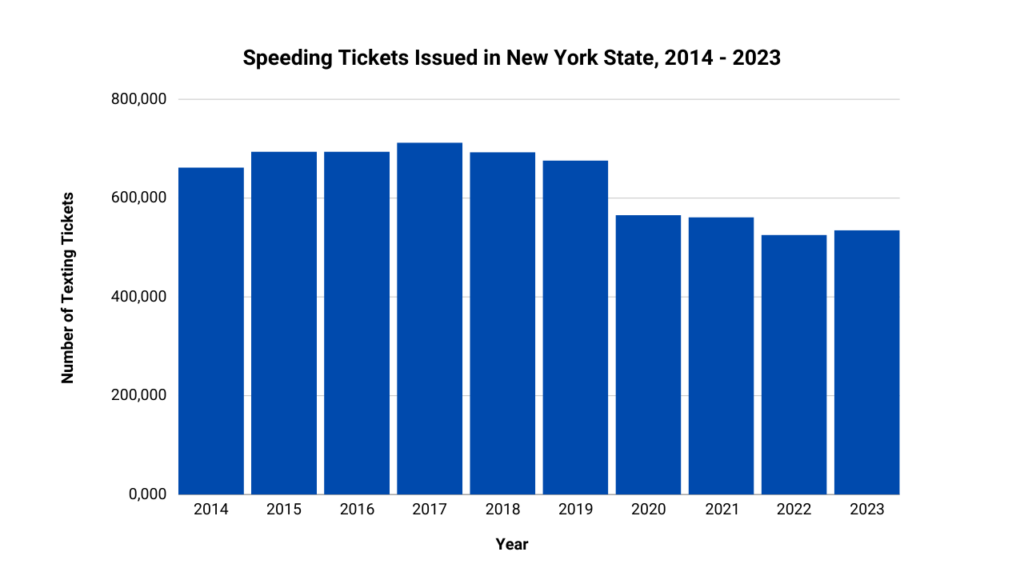
March and August 2023 showed the highest number of speeding tickets issued by month, with police handing out 48,312 and 50,763 speeding tickets, respectively. During the last few months of the year, the number of speeding tickets dropped off compared to the earlier months: only 42,477 speeding tickets were given out in November and 35,681 in December.
New York State Police issued the highest number of speeding tickets, amounting to 58% of the total tickets. On the other hand, local law enforcement agencies also ticketed drivers for speeding, such as the NYPD (14.8%), county police (8.3%), and other agencies (18.9%).
Westchester County took the lead as the county with the most speeding tickets issued (38,311 tickets), far outpacing the other counties. Erie and Suffolk followed with 33,238 and 32,695 tickets, respectively. Queens, a borough of New York City, has 26,078 tickets, while Orange County (22,734 tickets) appears to have a lower frequency of speeding violations compared to the rest of the counties.
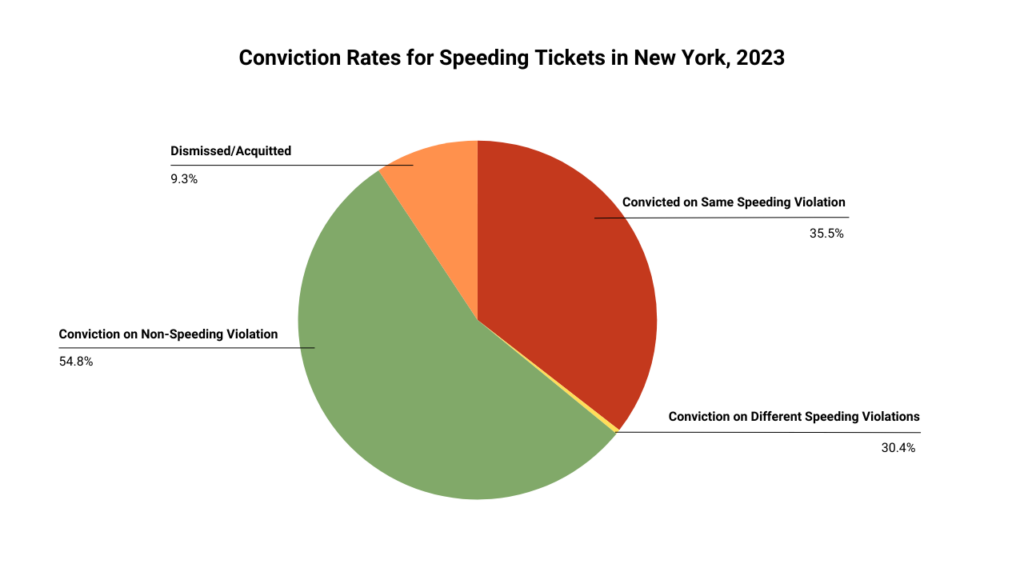
Accumulating too many points on your driving record can result in license suspension or revocation. This can impact your ability to drive to work or school, as well as other daily activities. Additionally, having points on your record can result in increased car insurance premiums, making it more expensive to operate your vehicle. That’s why it's important for drivers to resolve their speeding tickets quickly and with the least impact on their lives as possible.
More Resources
- Supporting Depositions and New York Traffic Tickets: What You Need to Know
- Speeding tickets and Pretrial Conference
- A Guide to Handling Your First NY Speeding Ticket
- Speeding With a Junior License or Restricted License in New York
- Second or Third Speeding Ticket in New York
- How To Fight A NY Speeding Ticket – A Comprehensive Guide
- Speeding Tickets in Manhattan (New York County), NY
- Driving Too Slow
- Out-Of-State Traffic Ticket With NY License
- Do NY Speeding Tickets Show Up on a Background Check?
- Speeding Tickets in NY With NJ license
- NY Speeding Tickets and Pretrial Conference
- Can I Go to Jail for Speeding in New York?

